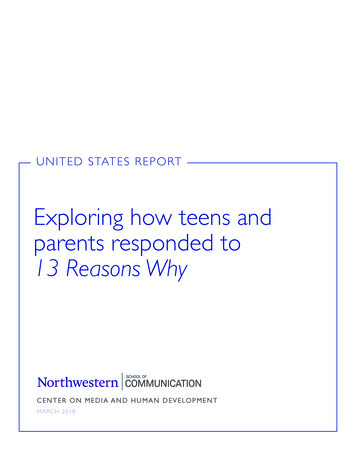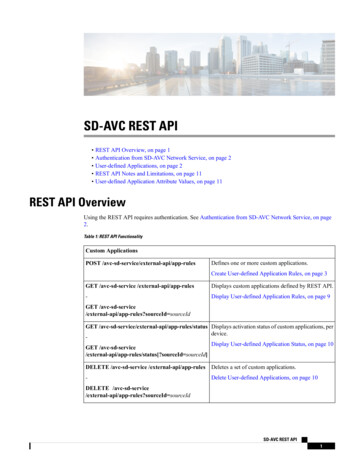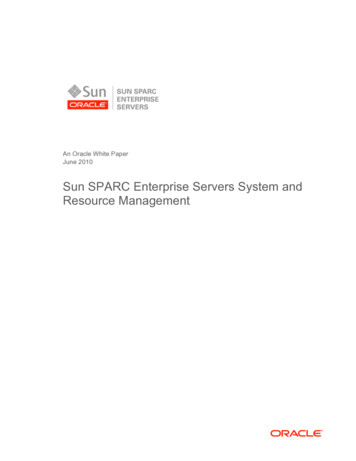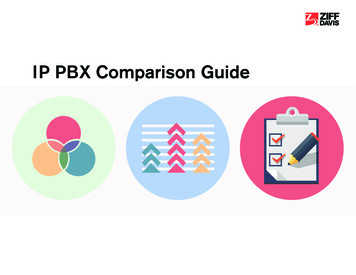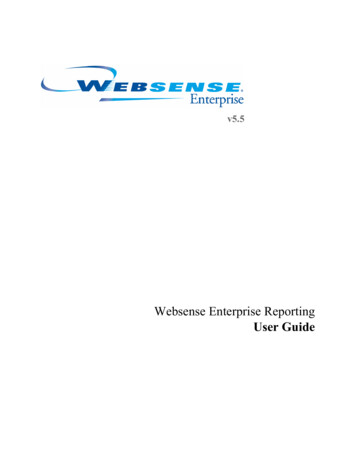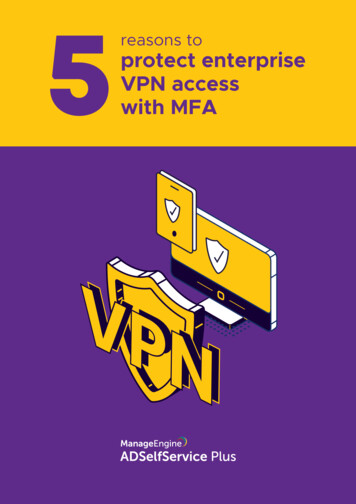
Transcription
reasons toprotect enterpriseVPN accesswith MFAVPN
Table of ContentsIs VPN a gateway to vulnerability?1Criminals target credentials1Use MFA to secure VPN access25 reasons to protect enterprise VPN access with modern MFA2Reason 1: Dealing with stolen credentials2Reason 2: Achieving regulatory compliance3Reason 3: Gaining visibility in VPN access and authentication failures3Reason 4: Improving security with advanced authentication controls4Reason 5: Supporting consistent access security for on-premises and cloud apps4Modernize VPN security with ADSelfService Plus5Behind the scenes: VPN MFA in action5Supported authentication techniques6Supported VPN providers6Conclusion7About ADSelfService Plus7
Is VPN a gateway tovulnerability?Virtual Private Networks (VPNs) have now become the de facto method for allowing usersto securely access internal resources through the organization’s intranet when they arelocated outside the office. While VPNs aim to promote better connectivity fororganizations, IT teams face growing challenges to secure their VPN.Criminals target credentialsAccording to the United States Department of Homeland Security, “the surge inteleworking has increased the use of potentially vulnerable services, such as VPNs,amplifying the threat to individuals and organizations”.1Enterprises consider VPNs to be one of the most important security technologies2 (Fig. 1).However, as most VPN solutions only require user credentials for logging in, they are highlysusceptible to data breaches. Employing multi-factor authentication (MFA) reduces therisks caused due to credential-based cyberattacks by 99.9 percent, as the primaryauthentication factor is combined with an additional authentication factor.3Figure 1: VPNs are one of the most essential security technologies.1
Use MFA to secure VPN accessThe goal of an MFA solution is to provide greater assurances about the identities of userswho attempt to access internal resources through a VPN. With MFA enabled,cybercriminals are not able to breach user accounts, even with compromised credentials.For ensuring the utmost security, not any MFA solution would do as not all are createdequal.Most MFA solutions:1. Are cumbersome to deploy.2. Support only limited authenticators, and these can be circumvented by hackers.3. Provide a poor user experience.This inevitably will result in reduced return on investment (ROI) and poor user adoptionrates.5 reasons to protect enterpriseVPN access with modern MFAReason1Dealing with stolen credentialsStolen passwords are one of the top vectors responsible for data breaches.4When users adopt weak passwords to secure their VPN accounts, hackerscan exploit password dumps or leverage credential-based attacks to breachtheir accounts. The hacker can then install malware, move laterally, andinitiate actions to breach high-profile accounts.Using MFA can stop such cyberattacks in its tracks because it verifies useridentities before granting access, utilizing a secondary authenticator likebiometrics or YubiKey.2
Reason2Achieving regulatory complianceFor example, HIPAA requires organizations with electronic protected healthinformation (ePHI) data data to secure all remote access, including throughVPNs, with MFA. Data breaches due to non compliance result in hefty fines,and leave the organization's reputation in shreds.Glossary:1. NIST: National Institute of Standards and Technology2. GDPR: General Data Protection and Regulation3. HIPAA: Health Insurance Portability and Accountability4. NYCRR: New York Codes, Rules and Regulations5. FFIEC: Federal Financial Institutions Examination Council6. PCI DSS: Payment Card Industry Data Security StandardsReason3Gaining visibility in VPN accessand authentication failuresAs an IT administrator, you need to monitor VPN activities of remoteemployees for auditing purposes, and to ward off potential threats. In anutshell, admins need data on who connects via VPN, when, and whatactivities are being performed.MFA solutions generate reports that provide insights into unusual orsuspicious activities, time of logon, VPN usage during peak and off-peakhours, VPN usage trends, authentication failures, and more.3
Reason4Improving security with advancedauthentication controlsA general consensus among admins is that biometrics and token-basedauthentication like YubiKey are more effective than techniques like securityquestions and answers, or SMS-based verification codes.5 This is becausehackers are initiating more sophisticated attacks, like SIM swapping, socialengineering, or phishing, to circumvent basic MFA techniques.Older MFA techniques are not strong enough to stop hackers. Only modernMFA solutions support advanced authenticators that keep most hackers atbay.Reason5Supporting consistent accesssecurity for on-premises andcloud appsWith organizations adopting the cloud in droves, admins need to effectivelysecure remote access for both on-premises and cloud application access.Failing to do so, or creating a separate process for on-premises and thecloud, will create inconsistencies in resource access.Using advanced MFA solutions will ensure consistent, secure access througha secondary authentication factor for both internal network access duringVPN logins, and enterprise cloud application access during single sign-ons.4
Modernize VPN security withADSelfService PlusADSelfService Plus is an integrated self-service password management and single sign-onsolution. It secures VPN access to network resources with MFA.AD AuthenticationPrimary AuthenticationNPSExtensionRADIUS RequestRemote User/VPN ClientVPN Gateway ServerNPS ServerCorporatenetworkADSelfService Plus MFASecondary AuthenticationWith organizations adopting the cloud in droves, admins need to effectively secureremote access for both on-premises and cloud application access. Failing to do so, orcreating a separate process for on-premises and the cloud, will create inconsistencies inresource access.Using advanced MFA solutions will ensure consistent, secure access through a secondaryauthentication factor for both internal network access during VPN logins, and enterprisecloud application access during single sign-ons.Behind the scenes: VPN MFA in action1. A user tries to establish a VPN connection by providing their username and passwordto the VPN server.2. The VPN server sends the authentication request to the Windows Network Policy Server(NPS) where the ADSelfService Plus’ NPS extension is installed.3. If the username and password combination is correct, the NPS extension contacts theADSelfService Plus server, and raises a request for second-factor authentication.4. The user performs authentication through the method configured by the admin.The result of the authentication is sent to the NPS extension in the NPS.5. If the authentication is successful, the NPS conveys this to the VPN server.5
Supported VPN authentication methods:Push notificationBiometric authenticationTime-based one-time password (TOTP) authenticationGoogle AuthenticatorMicrosoft AuthenticatorYubiKey AuthenticatorSupported VPN providersADSelfService Plus aids all RADIUS-supported VPN providers. Some of the topVPN providers supported by ADSelfService Plus are:FortinetCheckpoint EndPoint ConnectCisco IPSecSonicWall Global VPNCisco AnyConnectOpenVPN Access ServerWindows Native VPNPalo AltoSonicWall NetExtenderJuniper and other RADIUS-supportedPulseVPN providersIn addition to supporting VPN MFA, ADSelfService Plus provides MFA during:1. Self-service password reset and account unlocks2. Machine logins3. Cloud application access during single sign-on6
Conclusion: Not all MFA solutions are created equal. With cyberattacks exploiting VPNexposures on the rise, it's time organizations select an MFA solution that providesadvanced authentication controls, comprehensive reports, and is easy to utilize by bothadmins and users. ADSelfService Plus accomplishes all this and more to protect yourorganization against data breaches, and ensure regulatory compliance.Footnotes1. https://us-cert.cisa.gov/ncas/alerts/aa20-099a2. Ponemon-Report.pdf3. cent-of-account-attacks/4. bir/5. ingMultiFactorAuthentication.pdfADSelfService Plus is an integrated self-service password management and single sign-on solution.It offers password self-service, MFA for endpoints, password expiration reminders, a self-servicedirectory updater, a multi-platform password synchronizer, and single sign-on for enterpriseapplications. ADSelfService Plus also offers both Android and iOS mobile apps to facilitateself-service for end users anywhere, at any time. ADSelfService Plus supports IT help desks byreducing password reset tickets, and spares end users the frustration caused by computerdowntime.
Pulse Checkpoint EndPoint Connect SonicWall Global VPN OpenVPN Access Server Palo Alto Juniper and other RADIUS-supported VPN providers ADSelfService Plus aids all RADIUS-supported VPN providers. Some of the top VPN providers supported by ADSelfService Plus are: In addition to supporting VPN MFA, ADSelfService Plus provides MFA during: 1.
